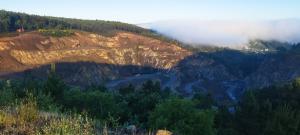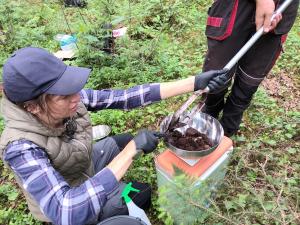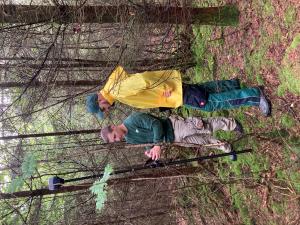BIOservicES announces the end of one of the most extensive soil sampling campaigns in Europe
The BIOservicES project made significant progress in delivering new knowledge about the functions and services of soil ecosystems associated with soil organisms
BIOservicES hypothesizes that translating the ecosystem services to which soil organisms contribute into monetary values and designing new incentives at the private and public levels will increase awareness about the opportunities of investing in soil health. To validate these hypotheses, BIOservicES performed an observational study on three management intensities in 25 experimental sites with eight different land uses (field scale) and integrated all land uses within a region (landscape scale). The 25 experimental sites are distributed across five biogeographical regions: Alpine (Switzerland), Atlantic (Spain), Boreal (Latvia), Continental (Germany), and Mediterranean (Spain). The land uses studied include urban, industrial, agricultural, forestry, mining, semi-natural, wetland, and dryland, collectively covering 95% of the EU's surface.
Raul Zornoza Belmonte, the BIOservicES Project Coordinator and professor at the Polytechnic University of Cartagena, stated: ‘Although the importance of soil organisms in delivering multiple ecosystem services is well-established, there is still a lack of research regarding the correlation between key soil organisms and the delivery of crucial ecosystem services in different land uses. With the soil sampling campaign, we aim to characterize soil biodiversity—covering a range of organisms from archaea, bacteria, and fungi to microarthropods, earthworms, and spiders—while assessing essential ecosystem functions and services through specific, stakeholder-agreed measures. By working closely with social science experts, stakeholders, and EU and international organizations to standardize methods and develop relevant indicators, we will create computational tools powered by Artificial Intelligence to model these relationships across various scales. This approach will allow us to not only reveal the connections between critical soil organisms, soil structure, and ecosystem services but also predict the effects of climate change on these systems over time and space.’
The soil sampling campaign was one of the most extensive campaigns organized in European-funded projects, based on the number of samplings collected, the resources involved, and the timeframe. The sampling campaign was conducted over ten weeks, with human resources varying from 6-12 people in each experimental site, with different equipment used based on the extraction type.
Following an extensive soil sampling campaign, a significant climate change experiment was launched across selected sites in Alpine, Atlantic, Boreal, and Mediterranean regions to explore soil health under future climate scenarios. Open climate chambers and rain shelters have been installed to simulate climate conditions predicted for 2100, focusing on semi-natural land uses that experience minimal external disturbances, such as fertilization or heavy machinery. This will allow researchers to observe soil responses solely attributed to climate factors, which are essential given these regions' contrasting organic carbon levels, temperatures, and moisture profiles.
Andrés Rodríguez Seijo, Researcher at the University of Vigo and coordinator of the work package Soil Biodiversity and Ecosystem Functions and Services across biogeographic areas and land uses declares: ‘Traditionally, human activities have placed pressure on soil health, mainly due to chemical, physical, or biological degradation. It's expected to modify soil properties and soil organisms' amount and richness. Climate change can exacerbate these effects by increasing soil temperature, altering moisture levels, and intensifying erosion due to extreme weather events like floods and droughts. These changes are expected to impact soil properties and biodiversity, such as changes in the distribution and activity of soil organisms. It's expected that these changes could impact soil organisms' distribution or their activity because each organism usually has a temperature range for their biological activity that can be modified..’
The institutions involved in the soil sampling campaign and activities are the Latvian State Forest Research Institute "Silava", the University of Vigo, the Johann Heinrich von Thünen Institute, the Spanish National Research Council, the Research Institute of Organic Agriculture FiBL, Soluciones Agrícolas Cultivate, and Rīgas meži.
The project has received funding from the European Union’s Horizon Europe Research and Innovation Programme under Grant Agreement 101112374, securing a total amount of €9,012,377, with €620,181 from Innovate UK, and €993,656 from the State Secretariat for Education, Research and Innovation in Switzerland.
###
About BIOservicES
The BIOservicES project, led by the Polytechnic University of Cartagena and coordinated by Professor Raul Zornoza, started in September 2023. BIOservicES aims to understand the interconnection between soil organisms and the delivery of multiple soil ecosystem functions and services at different scales, identifying the pressures and drivers resulting from different land uses and climate change, and performing an economic valuation of the contribution of soil organisms to ecosystem services. BIOservicES aims to provide new insights, indicators, and digital decision-making tools to help design climate-resilient management practices and monitoring, conservation, and restoration programs adapted to various European environments. These programs will maintain and enhance the multiple soil ecosystem functions and services in which soil organisms play a critical role. The 60-month project with a 7 million euro budget will bring together 22 partners from 11 countries, ranging from public institutions to universities, NGOs, and private companies.
BIOservicES
Polytechnic University of Cartagena, Raul Zornoza Belmote - Project Coordinator
raul.zornoza@upct.es
Media Contact
June Communications - Coordinator for BIOservicES Communication and Dissemination
Iuliana Floricica
iuliana.floricica@junecom.ro
+40 743037222
Iuliana Floricica
June Communications
+40 743 037 222
email us here
Visit us on social media:
Facebook
X
LinkedIn
Instagram
YouTube
WATCH NOW: BIOservicES Soil Sampling Campaign Alpine Region 2024 at https://www.youtube.com/shorts/LHZuijU6Yz8

1 https://bioservices-project.eu/blog/
2 https://bioservices-project.eu/
3 https://bioservices-project.eu/case-studies/



